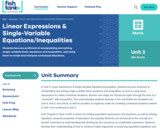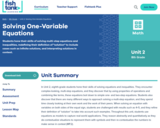
Overview of the four basic number properties with examples.
- Subject:
- Mathematics
- Material Type:
- Reading
- Date Added:
- 12/01/2023

Overview of the four basic number properties with examples.

Students become proficient at manipulating and solving single-variable linear equations and inequalities, and using them to model and interpret contextual situations.


Getting Started
Type of Unit: Introduction
Prior Knowledge
Students should be able to:
Solve and write numerical equations for whole number addition, subtraction, multiplication, and division problems.
Use parentheses to evaluate numerical expressions.
Identify and use the properties of operations.
Lesson Flow
In this unit, students are introduced to the rituals and routines that build a successful classroom math community and they are introduced to the basic features of the digital course that they will use throughout the year.
An introductory card sort activity matches students with their partner for the week. Then over the course of the week, students learn about the lesson routines: Opening, Work Time, Ways of Thinking, Apply the Learning, Summary of the Math, and Reflection. Students learn how to present their work to the class, the importance of taking responsibility for their own learning, and how to effectively participate in the classroom math community.
Students then work on Gallery problems to further explore the program’s technology resources and tools and learn how to organize their work.
The mathematical work of the unit focuses on numerical expressions, including card sort activities in which students identify equivalent expressions and match an expression card to a word card that describes its meaning. Students use the properties of operations to identify equivalent expressions and to find unknown values in equations.

The class reviews the properties of operations. The use of “ask myself” questions to make sense of problems and persevere is modeled. Students review things to do when they feel stuck on a problem. Finally, students use the properties of operations to evaluate expressions.Key ConceptsStudents use the properties of operations to justify whether two expressions are equivalent.Goals and Learning ObjectivesTo start to work on a problem, make sense of the problem by using “ask myself” questions.Persevere in solving a problem even when feeling stuck.Use the properties of operations to evaluate expressions.

Students discuss as a class the important ways that listeners contribute to mathematical discussions during Ways of Thinking presentations. Students then use the properties of operations to find the value of each fruit used in equations.Key ConceptsStudents use the properties of operations to find the value of each fruit used in different equations. By considering several equations, students can match each of the 10 fruits to the whole numbers 0 through 9. This work helps students see why representing unknown numbers with letters is useful.Goals and Learning ObjectivesContribute as listeners during the Ways of Thinking discussion.Identify the whole numbers that make an equation true.Use the properties of operations, when appropriate, to justify which whole numbers represent unknown values.

Learn about the competitive sport of fencing along with the resulting mathematical problems and equivalent expressions that help determine the number of matches played per tournament in this video from the Center for Asian American Media. This resource is part of the Math at the Core: Middle School Collection. [2:23]

Students hone their skills of solving multi-step equations and inequalities, redefining their definition of "solution" to include cases such as infinite solutions, and interpreting solutions in context.